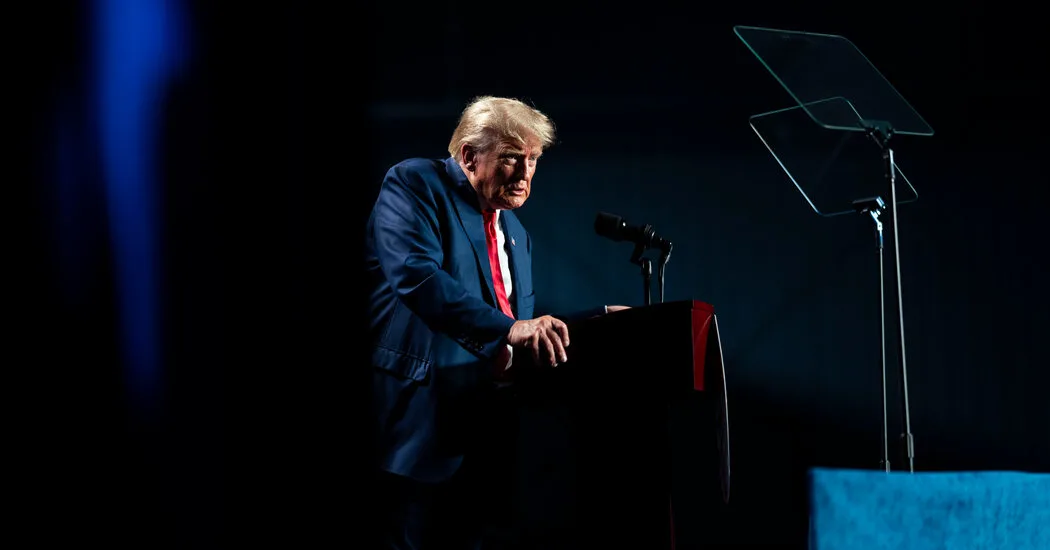
In July, a federal judge rejected an attempt by former President Donald J. Trump’s lawyers to move a pending criminal case against him in Manhattan from state to federal court.
Now that Mr. Trump has been charged with criminal conspiracy to change the results of the 2020 presidential election in Georgia, his legal team in Atlanta is almost certain to try the same maneuver.
Moving the sprawling racketeering case against him and his allies to federal court would have advantages for Mr. Trump, the most obvious being that the jury pool for a trial would be drawn from a broader area than Fulton County, Ga., the Democratic stronghold where the charges were brought on Monday night.
And it could make it more likely that the U.S. Supreme Court, a third of whose justices are Trump appointees, would ultimately weigh in on where the trial should be held.
Ahead of Mr. Trump’s indictment, legal experts offered a variety of views about whether a motion to move the trial to federal court would succeed in the Georgia case.
As they did in Manhattan, Mr. Trump’s lawyers are likely to argue that the case should be moved to federal court because it concerns acts he took as president and so falls under federal jurisdiction.
That argument failed in New York, where the indictment focused on a hush money payment to a porn star who had threatened to go public with her story that she had had an extramarital affair with Mr. Trump.
“Hush money paid to an adult film star is not related to a president’s official acts,” Alvin K. Hellerstein, a federal judge in Manhattan, ruled in that case, adding that “it does not reflect in any way the color of the president’s official duties.”
Though the circumstances are different, Mr. Trump might have the same difficulty arguing that actions he took to stay in power after he lost the 2020 election to Joseph R. Biden Jr. — the focus of the Georgia case — were official acts as president.
The Georgia investigation has focused, for instance, on a call that Mr. Trump made weeks after the election to pressure Georgia’s secretary of state, Brad Raffensperger, to “find” enough votes to allow him to claim victory.
Several lawyers interviewed said it was a stretch to construe such actions as official presidential duties. Still, the lawyers had varying views about whether a motion to remove the case to federal court would succeed.
Gwen Keyes Fleming, a former district attorney in DeKalb County, Ga., near Atlanta, said she thought such a motion would have a good chance of succeeding.
“He would argue that he was an officer of the United States and acting in connection to his status as an elected officer,” she said in an interview.
But Norman Eisen, special counsel to the House Judiciary Committee during Mr. Trump’s first impeachment, said “the removal motion that Trump will inevitably try in the Georgia case should charges be filed is doomed to fail.”
Clark D. Cunningham, a professor of law and ethics at Georgia State University, said he thought that “ultimately his attempt to remove the state prosecution would be unsuccessful” but added, “I do think that it would drag on for a long time in the federal courts if the district attorney chooses to fight the removal. And it would not at all surprise me if the issue of the removal went up to the U.S. Supreme Court.”
If such a move succeeded, how would a potential jury pool change? Jurors for trials “are drawn from the counties that comprise the division in which the case is pending,” said Kevin P. Weimer, the federal clerk of court for the Northern District of Georgia.
The Northern District of Georgia has four divisions. Fulton County is in the Atlanta division, which comprises 10 counties. Moving the case from Fulton County Superior Court to the Atlanta division of the Federal District Court could give Mr. Trump a modest advantage: In the 2020 election, Mr. Trump received 26.2 percent of the vote in Fulton County; in the same election, he received about 33.5 percent in the counties that make up the Atlanta division.
“I think that the district attorney is faced with a difficult and complex strategic decision” should Mr. Trump seek to have the case removed to federal court, Mr. Cunningham said, referring to Fani T. Willis, the Fulton County district attorney. “If she fights removal, she almost certainly delays the criminal case moving forward for a long time.”


